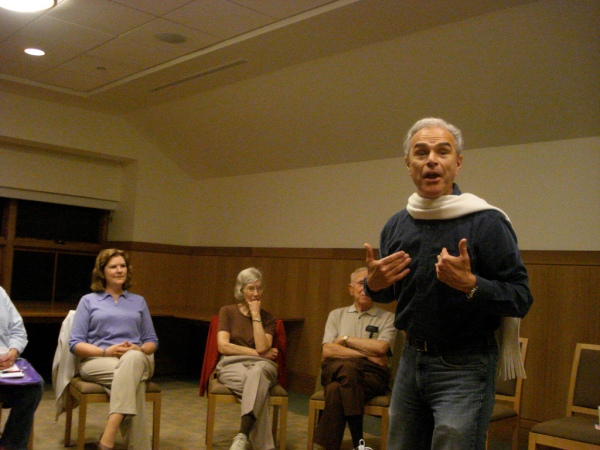
Storytelling circle. Photo by Darien Library (via Creative Commons)
I turned to my wife and said, “So how deeply is God planning to humiliate me?”
You ever say something you wish you could take back?
Frustration gave rise to words that fell out of my mouth like dead birds thumping onto a stone floor. The stories we tell ourselves and the stories we tell others are distorted by our blind eyes and deaf ears. We speak wrongly because we see wrongly and we hear wrongly.
The other night, I took a stack of 3 x 5 cards and wrote various movie genres on each card like “Comedy,” “Sci-Fi,” “Mystery” and “Horror.” Then I handed each person in the group card and asked them to tell their story in the genre listed on the card. Within moments, one person told a story of their life as mystery, another as war, another as sci-fi. The genre gave us a lens through which we filtered our memories and perspectives.
As we listen and tell stories, we may realize that our own story is a mystery, a comedy, a tragedy, an adventure and even a horror story. And yet, there are times, we trap ourselves in one story. It may be the story of a relentless pursuit for money like Gordon Gekko in “Wall Street.” It may be the tale of unredeemable regret like Briony Tallis in “Atonement.”
We may get stuck in tragedies like the never-ending martyr, abandoned lover, or forsaken friend. We may die in those stories. Judas betrayed Jesus and then hung himself before the story changed. Peter betrayed Jesus, but later was surprised with the story of renewed love and fellowship as Jesus walked with him along the beach.
Our dreams, hopes and fantasies may collide with our lives. In the fog of the struggle, we may grow blind to all memories and experiences of joy and blessing and love, as we are swallowed by pain and hurt and humiliation. I know this is so because I’ve often been trapped in the wrong stories. Stories I told. Stories I rehearsed. Stories I believed. Stories that were plainly and simply false.
We’re good at believing false stories. Either believing our own press that we’re better than we are or believing the lies of hopelessness and despair.
Two men stumble toward Emmaus. As they walk, they rehearse the loss of every hope, every dream, every thing. Just a few days ago they were watching the beginning of a new day for all of Israel. The long awaited king had finally come. While he still walked and talked in secret, the unveiling of his kingdom and restoration of Israel was imminent. Just a week ago it seemed Jesus was about to ascend his throne and bring the enemies of Israel under his footstool.
But the sun set and would never rise again. They stumbled in dark rehearsing the strange turn of events as Jesus fell into the hands of the wicked and seemed powerless to resist. The one who commanded demons, who raised the dead, who commanded the skies and seas, could not stop the deadly blows of his enemies. Within hours of capture, he was brutally tortured, mocked and hung till dead.
Walking in the sickening grief of all consuming loss, they told a story of monumental tragedy and loss. They told their story to one another. They told their story to the stranger who walked beside them.
As they turned aside for the evening, the stranger turned the story upon them. He stepped into their story. He rehearsed their story, Israel’s story, the story of a world forsaken and cursed by God. As he retold the story, he unveiled the light of God’s faithful Word, stretching from Eden to the end of time. Where they saw despair, he revealed hope. Where they saw loss, he revealed gain. Where they saw death, he revealed life.
Jesus stepped into their story and changed everything. He freed them from the binding and blinding power of stories that crippled and isolated His people from the unveiling of His love. Jesus enters into the story of His people again and again, with light for darkness, laughter for sorrow, life for death.
Sometimes we find ourselves trapped in stories–even good ones. But we are still so very blind and so very deaf. What do we do?
We bring our successes and sorrows to Jesus, the One who was dead but now is Alive forevermore. We come, we cry, we listen, we wait.
Only He can gives us eyes to see and ears to hear. He can teach us how to sing in the dark, laugh in the face of death, play in the light of His unending love. Come Spirit of Christ and teach us. We are blind and we are weak, and we long to hear you, we long to see you.
As we listen to the rhythms of His story, we learn to sing again. Our words take flight and rise into the skies joining in a song of praise to the wonders of His grace.